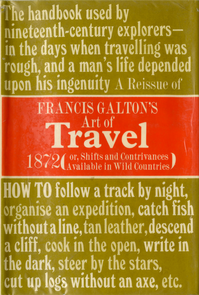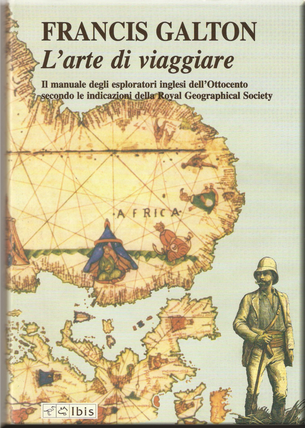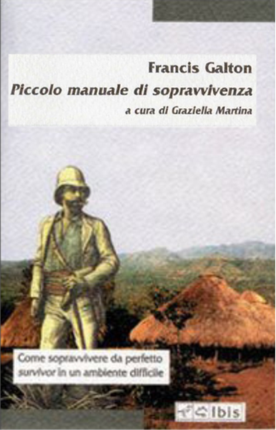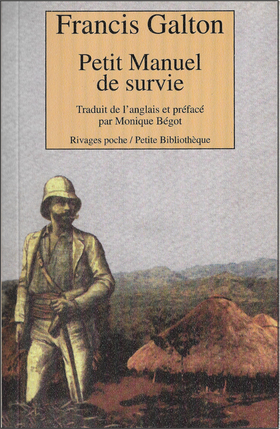
Questi sono i testi che sono stati inseriti sul sito linguistico culturale dell'UNESCO

Galton, Francis: L'arte di viaggiare : il manuale degli esploratori inglesi dell'Ottocento secondo le indicazioni della Royal geographical society [Italian] / Martina, Graziella / Como: Ibis [Italy], 1999. 314 p. ill. The art of travel, or Shifts and contrivances available in wild countries [English]
The handbook used by nineteenth century explorers in the days when travelling was rough, and a man's life depended upon his ingenuity. A Reissue of HOW TO follow a track by night, organize an expedition, catch fish without a line, tan leather, descend a cliff, cook in the open, write in the dark, steer by the stars, cut up logs, without an axe, etc...
Galton, Francis: (Martina, Graziella): Piccolo manuale di sopravvivenza : nozioni fondamentali per affrontare un ambiente difficile [Italian] (ISBN: 88-7164-105-1) / Martina, Graziella / Como: Ibis [Italy], 2001. 151 p., ill., 1 ritr. The art of travel, or Shifts and contrivances available in wild countries [English]
Galton, Francis: Petit manuel de survie ou Méthodes et conseils pour subsister dans un environnement hostile [French] (ISBN: 2-7436-1277-0) / Bégot, Monique / Paris: Payot et Rivages [France], 2004. 221 p., ill., couv. ill. en coul. The art of travel [English]
From cherished historic monuments and museums to living heritage practices and contemporary art forms, culture enriches our lives in countless ways and helps build inclusive, innovative and resilient communities.
Protecting and safeguarding the world’s cultural and natural heritage and supporting creativity and dynamic cultural sectors are fundamental to addressing the challenges of our time, from climate change to poverty, inequality, the digital divide and ever more complex emergencies and conflicts. UNESCO is convinced that no development can be sustainable without a strong culture component. Indeed only a human-centred approach to development based on mutual respect and open dialogue among cultures can lead to lasting peace.
Dai monumenti storici e musei più preziosi alle pratiche del patrimonio vivente e alle forme d'arte contemporanea, la cultura arricchisce le nostre vite in innumerevoli modi e contribuisce a costruire comunità inclusive, innovative e resilienti.
Proteggere e salvaguardare il patrimonio culturale e naturale del mondo e sostenere la creatività e i settori culturali dinamici sono fondamentali per affrontare le sfide del nostro tempo, dal cambiamento climatico alla povertà, alla disuguaglianza, al divario digitale e alle emergenze e ai conflitti sempre più complessi. L'UNESCO è convinta che nessuno sviluppo possa essere sostenibile senza una forte componente culturale. Infatti, solo un approccio allo sviluppo incentrato sull'uomo, basato sul rispetto reciproco e sul dialogo aperto tra le culture, può portare a una pace duratura.



